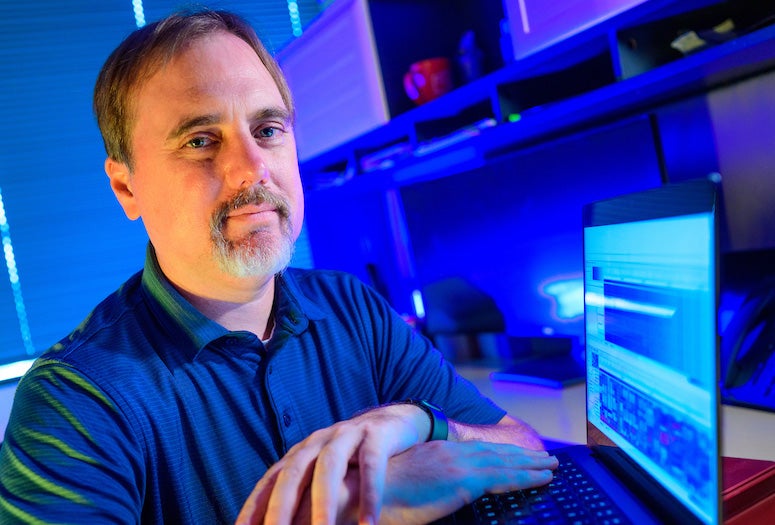The Ken Kennedy Institute's April Member of the Month: Todd Treangen, Associate Professor of Computer Science
Todd Treangen received his BSc in Computer Science from the University of Nebraska, and both MSc and Ph.D. degrees in Computer Science from the Polytechnic University of Catalonia (Spain). He joined the Computer Science department at Rice University as an Assistant Professor in July 2018 and received an NSF Career Award in 2023 to "characterize previously unseen pathogens that are likely to be dangerous to humans in pursuit of improved preparedness and prevention of pathogen spread."
Prior to joining Rice, he was a Research Scientist at the Center for Bioinformatics and Computational Biology (CBCB) at the University of Maryland College Park, and previously a Principal Investigator at the National Biodefense Analysis and Countermeasures Center (NBACC). While at the Polytechnic University of Catalonia, he received the Europeus Doctor Distinction (highest honor).
How would you explain your research in 1-2 sentences?
My research focuses on designing, developing, and deploying lightweight computational tools to facilitate rapid characterization of known and previously unseen bacteria and viruses.
How does your work impact the community at large?
My research group aims to build open-source software for the greater good in the Houston community and beyond. A few examples include: improved diarrheal disease classification in children and adults
(https://pubmed.ncbi.nlm.nih.gov/37962956/), the pursuit of novel biomarkers of concussion in collegiate football players (https://pubmed.ncbi.nlm.nih.gov/35284846/), to detecting the arrival of Omicron in Houston soon after it arrived (https://www.cdc.gov/mmwr/volumes/71/wr/mm7103a5.htm).
What kind of collaborations are you looking for at Rice and within the community?
Since joining Rice in 2018, my group has benefited from several collaborative research projects with numerous faculty at Rice (Biosciences, Bioengineering, Civil and Environmental Engineering, Chemical and Biological Engineering, Computer Science, Electrical and Computer Engineering, Earth, Environmental and Planetary Sciences) as well as with neuroscientists, genomic scientists, infectious disease experts, and clinicians within the Texas Medical Center (Baylor College of Medicine, Houston Methodist Research Institute, MD Anderson Cancer Center, Texas Children’s Hospital, and UT Health).
I’m constantly on the lookout for interdisciplinary collaborative research avenues, particularly those with relevance to tracking the impact of microbes on human health and disease.
How do you see computation and data advancing in the future?
It is incredible to reflect on some of the major advances in computing since I joined Rice six years ago. I’m constantly inspired by the work of my amazing colleagues at Rice, and I view the research focus areas of the School of Engineering as great places to pay attention to for advances in computation and data. One concrete example of where I see computation and data playing a major role is in the area of resilient and adaptive communities specific to biosurveillance for pandemic preparedness and prevention
(https://engineering.rice.edu/news/how-computer-science-will-help-prevent-next-pandemic).
How has the Ken Kennedy Institute helped you and/or your research?
The Ken Kennedy Institute has served as a bedrock of support for research, outreach, and community engagement. Thanks to support from the institute, I’ve organized numerous COVID-19 virtual research symposiums, organized multiple in person genomics workshops, and participated in the Ken Kennedy Institute's annual AI in Health Conferences. Details of previous collaborations (RAD Genomics Workshop, RAD Microbes Boot Camp, COVID-19 Symposium) here: https://kenkennedy.rice.edu/research-workshop-collaborations.
What is your favorite book or movie?
One of my favorite books with relevance to my research at Rice is “Microbe Hunters” by Paul de Kruif. This nearly century old novel served as inspiration while I was a postdoctoral scientist building computational tools to “hunt” microbial genome evolution at the Institut Pasteur (https://www.eurekalert.org/news-releases/720432), fueled my interest to contribute to the Human Microbiome Project, and helped inspire one of the first courses I designed and created at Rice called “Computational Microbial Forensics."
Do you have any words of inspiration you would like to share?
“Nothing in life is to be feared, it is only to be understood. Now is the time to understand more, so that we may fear less.” – Dr. Marie Curie
_
See Todd's Rice Profile here.

